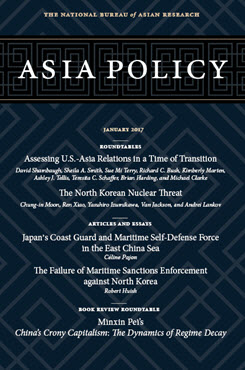Japan's Coast Guard and Maritime Self-Defense Force in the East China Sea
Can a Black-and-White System Adapt to a Gray-Zone Reality?
This essay examines the need for growing coordination between the Japan Coast Guard (JCG) and the Japan Maritime Self-Defense Force (JMSDF) to better cope with gray-zone situations.
EXECUTIVE SUMMARY
MAIN ARGUMENT
Coping with gray-zone situations is particularly challenging for Japan because its security posture is based on a binary system that complicates coordination between civilian and military agencies. In Japan, gray-zone situations generally refer to the challenges raised by China’s maritime activities around the disputed Senkaku Islands, creating situations that are neither peacetime nor wartime contingencies. Dealing with such situations requires careful and close management of law-enforcement contingencies that might escalate into military conflicts. Japan’s unique security system has so far prevented the adoption of a legal framework to regulate the coordination between the civilian JCG, which is primarily responsible for securing national waters, and the military JMSDF, which intervenes if a situation worsens. Despite some progress, legal and technical issues still prevent optimal cooperation between the two agencies, thus undermining Japan’s ability to respond to current challenges in the East China Sea.
POLICY IMPLICATIONS
- Because Japan has a binary security system that strictly divides civilian and military corps and activities, the country will struggle to adapt its institutions to China’s “salami slicing” strategy.
- Ensuring a well-integrated response to gray-zone situations would ideally require a legal framework defining more precisely these situations and articulating the respective roles of the JMSDF and JCG. If such a framework is not possible, other steps should be taken, such as expanding technical interoperability between the JMSDF and JCG; developing a common, integrated maritime domain awareness; and increasing training and exercises on more realistic scenarios.
- To improve its current security posture, Japan must implement a “whole of government” approach that ensures optimal coordination between civilian and military agencies rather than revising Article 9 of the constitution.
Céline Pajon is a Research Fellow in the Center for Asian Studies at the Institut français des relations internationales (Ifri).
About Asia Policy
Asia Policy is a peer-reviewed scholarly journal presenting policy-relevant academic research on the Asia-Pacific that draws clear and concise conclusions useful to today’s policymakers. Asia Policy is published quarterly in January, April, July, and October and accepts submissions on a rolling basis. Learn more


